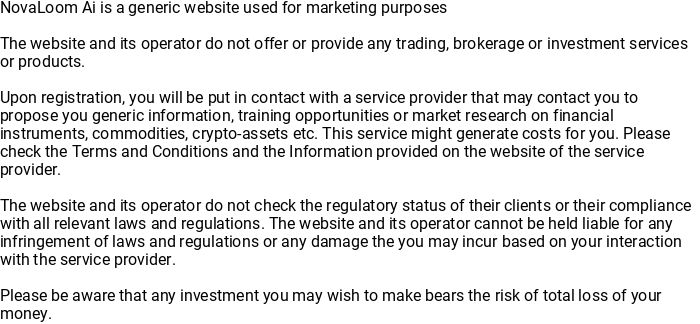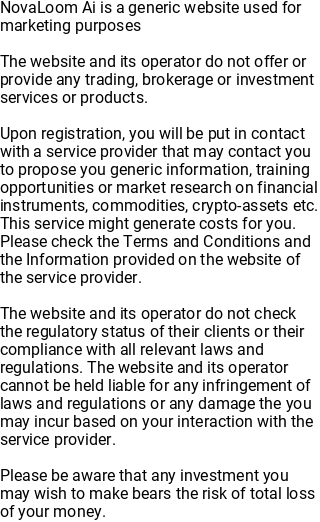Deep Reserveholm


The Deep Reserveholm website brings finance teachers to intending learners. By meeting, these tutors show learners the nitty-gritty of the financial world for educational purposes only.
As people learn, they’d be equipped to understand the financial world to make informed decisions regarding their resources. Deep Reserveholm opens the connection process to anyone interested across the globe.
Connecting with financial education firms on Deep Reserveholm requires people to fill out the registration form with their names, emails, and phone numbers. Deep Reserveholm will connect them instantly to suitable education companies, who will contact them through their representatives to provide support and set up their accounts.


The Deep Reserveholm solution is one that’s completely user-centric. With a focus on promoting financial literacy globally, those behind Deep Reserveholm decided to offer complimentary services. Cost is one of the barriers that has hindered many from getting a financial education. But not anymore. Register for free on Deep Reserveholm to connect with finance education firms.
Users can find whatever they need on Deep Reserveholm without confusion, as information, features, and buttons are well laid out.
This prevents delays in locating important features on the website and fast-tracks the registration process. Use Deep Reserveholm to connect with finance tutors. Registration on Deep Reserveholm is completely free.
While Deep Reserveholm is not an educator, it still shares bits of information to prepare people for their financial education ahead.
The information is detailed to help people understand the educational journey that awaits them. Register on Deep Reserveholm to connect with finance education companies and start learning.
Deep Reserveholm does not teach people to invest. It only connects people with financial education firms. Register on Deep Reserveholm and connect with one.
Since Deep Reserveholm does not offer education services, it does not assess anyone’s performance, offer correction, or grade them. That’s left to the education companies. Sign up and connect with a financial education website on Deep Reserveholm.
Deep Reserveholm does not offer financial guidance or advice. The website is only a link to a suitable finance education. Anyone can connect with finance education firms on Deep Reserveholm.
Financial education is enlightening people about the financial world and investing. It requires an educator to walk people through everything finance and investment entails. In the teaching process, the educators’ tasks lean towards researching trendy topics, creating and updating syllabuses, and designing course materials in different formats.
The teachers share their insights and test learners’ knowledge. Through learning, people can develop critical thinking abilities, learn about the psychological side of investing, assess financial risks, and more. Register on Deep Reserveholm to connect with finance teachers to access these and more.
Investing means capitalizing on market forces to make gains. This could be by lending money to others, buying an asset to resell after maturity, or owning a fraction of a company. Lenders may make money through interests, assets could provide returns when sold, while shareholders may get dividends. None of these works 100% of the time because of risks. Deep Reserveholm outlines some risk-related terms below:
Deep Reserveholm sees volatility as the fluctuation of asset or index prices in the market. Volatility occurs because of increased trading volume, economic news, or regulatory shifts. It often makes investors make short-term decisions, accrue increased costs, and become anxious. Nevertheless, one may manage the situation through diversification and refusal to sell. Learn more about volatility by registering on Deep Reserveholm.
Market risk premium is the difference between an investment’s expected return rate and risk-free rate. The three major types of market risk premiums are historical, required, and expected. In the historical risk premium, the return’s past performance determines the premium. Learn about the other premium types from investment teachers by registering on Deep Reserveholm.
Risk Analysis
Risk analysis assesses the risks associated with an investment and makes decisions based on the derived result. Sign up on Deep Reserveholm to learn more.
Standard Deviation
Standard deviation measures how risky or volatile an investment is. Get more information about standard deviation by signing up on Deep Reserveholm.
Risk-Reward Ratio
Risk-reward ratio measures an investment’s possible return against the risk of things not working out as expected.
The ratio is derived by dividing potential risk by the expected return. The result helps investors to manage risk, evaluate investment opportunities, and determine investment viability. To learn more, register on Deep Reserveholm.
Illiquidity is the inability to convert an asset to cash at a time, leading to a huge loss in asset value. Examples of illiquid assets are cars, real estate, private equity, long-term bonds, collectibles, and retirement accounts. While illiquid assets may support long-term holding and bring higher returns, they are open to liquidity risk. Find out more by connecting with investment tutors on Deep Reserveholm.

A debt schedule outlines a company’s debt based on its maturity. Debentures, loans, leases, and bonds are usually part of a debt schedule. The lender’s name, issue amount, balance, payment frequency, delivery date, floating or fixed interest, and debt maturity should be included when constructing a debt schedule.
Building a debt schedule lets a company keep accurate and accessible bookkeeping information. It may help a company not default on payment and decide whether it can afford more debt and meet the requirements to apply for a loan or sell bonds.
Companies often face certain issues when creating debt schedules. They include ensuring debt records are accurate, tracking down financial information recorded in different sources, and updating spreadsheets manually after issuing a debt. Learn more about debt schedules by signing up on Deep Reserveholm.
Insolvency is a person’s or company’s inability to fulfill their debt obligations when due. Cash flow insolvency exists when an entity has assets to pay creditors but not the appropriate payment form.
Causes of insolvency include lawsuits (from business partners or customers), high production costs, unskilled accounting personnel, and inability to provide new customer needs. When companies or business owners cannot satisfy their customers’ changing needs, there is a high likelihood that they will lose customers to their competitors. Deep Reserveholm discusses more debt-related concepts below:
Senior debt is a financial obligation that takes priority over other debts in bankruptcy or liquidation. This debt is collateralized (secured by a company’s assets). It also has covenants and low interest rates. Subordinated debt has a lesser priority than senior debt. It has a high interest rate, flexible, and unsecured. Get more information from suitable teachers by signing up on Deep Reserveholm.
Debt capacity is the amount a business can afford to owe and repay. It is determined by its market positioning and free cash flow profile. Lenders estimate a borrower’s debt capacity with total leverage, senior debt, net debt leverage, and interest coverage ratio. Factors such as disruption risk, seasonality, industry growth rate, barriers to entry, and cyclicality also determine a borrower’s debt capacity. Register on Deep Reserveholm to know more.
The market value of debt is the price an investor would pay for a company’s debt. Calculating this value helps to determine the true capital cost, estimate future projections for funding, and make informed financial decisions. Want to learn more? Connect with finance tutors on Deep Reserveholm.
A DCM banker is an investment banker who advises borrowers about raising new debts and managing pending ones. Generally, this professional assesses the lender’s and borrower’s needs, and interest rates. Get more details about how DCM bankers help both lenders and borrowers by registering on Deep Reserveholm.
A deductible is the amount an insurance provider charges a policyholder before assuming an expense. This payment is essential in an insurance contract because of moral hazard and claims reduction. A moral hazard is a behavioral risk that a policyholder will request for insurance payouts.
Claims reduction involves protecting an insurance company from paying out every insurance policy. In this case, a deductible shares risk between the policyholder and the insurer. Insurance types include health, auto, disability, life, business, and homeowners. Register on Deep Reserveholm for more information.


Sovereign debt is the government’s loan payment default. This situation might arise from insolvency, illiquidity, government change, economic recession, or overspending. When insolvent, a country cannot pay its debt because of increased public debt, government regulations in the market, and unemployment.
Also, when countries change leaders, the new government might not fulfill the financial obligation of the past government because it is considered personal and not state debt. Country debts are also left unpaid during military takeovers.
This situation affects both the state and the investors. The state can no longer access new funds because investors lose interest in them. On the other hand, the creditors lose their principal and interest. Get additional information from tutors by signing up on Deep Reserveholm.
Statutory reserves is a legal document insurance companies use for holding funds in reserve to protect policyholders’ future. It is calculated through two approaches - rule-based and principle-based. The rule-based approach uses static mathematical formulas that might not cover all policy risks, while the principle-based approach quantifies risks with risk analysis and management formulas. Want to understand more on statutory reserves? Sign up on Deep Reserveholm.
Chapter 11 bankruptcy means reorganizing a debtor’s assets and debts. Sign up on Deep Reserveholm for comprehensive information about this.
This section of the United States tax law allows taxpayers to treat some qualified stock purchases as asset acquisitions for federal income tax purposes. Register on Deep Reserveholm for more.
An IPO involves selling a private company’s shares to the public. Connect with investment teachers on Deep Reserveholm to know more.
A hot issue is an oversubscribed or overbought first-time IPO. Sign up on Deep Reserveholm to learn more.
A cash rich split off is a merger and acquisition technique a parent company uses to exchange its stock for its subsidiary’s stock without incurring taxes. Need to learn more? Sign up on Deep Reserveholm.
Public securities are debt or equity openly traded in a market. Learn how these securities are traded by registering on Deep Reserveholm.
Finance is a core part of the human experience. Without it, needs and goals may not be met or achieved. Learning how finance works and the management strategies is essential in today’s world. Deep Reserveholm helps people get financial literacy by connecting them to financial education firms. Want to connect and start learning? Sign up for free on Deep Reserveholm.
| 🤖 Initial Cost | Registration is without cost |
| 💰 Fee Policy | Zero fees applied |
| 📋 How to Register | Quick, no-hassle signup |
| 📊 Educational Scope | Offerings include Cryptocurrency, Forex, and Funds management |
| 🌎 Countries Serviced | Operates globally except in the USA |


